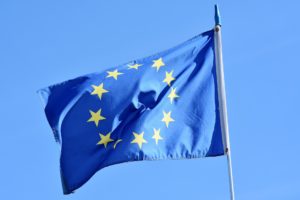Highlights from the Past Week
CW 48 / Monday, 29 November to Thursday, 2 December: Committee Meetings Week (Brussels);
DIGITAL SERVICES ACT – EP COMMITTEE VOTE ON 13/14 DECEMBER: Originally, the vote on the DSA report in the EU Parliament’s Industry Committee (IMCO) was scheduled for 8 November. However, this date could not be reached. Afterwards, there was talk of 9 December; in the draft agenda for the IMCO Committee, the vote is also found with the note “to be confirmed”. However, this is unlikely to happen.
As a dedicated website of the EU Parliament now clarifies, an exceptional committee meeting is to be scheduled in Strasbourg on 13 or 14 December. There and then, the report will be voted on, so that it can be confirmed in the plenary in January – to take place once again in Strasbourg.
In the meantime, a further draft of the changes, dated from 29 November, was circulated by various media (PDF), but is sure to already be partly outdated. Several technical meetings took place last week. The new majority, including the ECR, seems to stand firmly in the middle ground after the inclusion of provisions that would compel platforms to reinstate removed content. Motions from other committees were also largely passed over. More clarity on the status of the proposal is expected at the next (and presumably last) meeting on Monday. (see Euractiv)
The articles that are up for discussion are: Articles 1a on the scope of application, 2 on the definitions of online platforms, 7-9 on general monitoring and the orders, 13a on dark patterns, 19a on accessibility requirements, 22b on sustainable consumption, and 26 on risk assessment. This has been reported on by Politico Pro (paywall) from the Background Note (PDF). Contexte (paywall, FR) meanwhile published the corresponding compromise proposals (PDF).
DIGITAL MARKETS ACT – NEW DISCUSSIONS PRIOR TO PLENARY VOTE: As Euractiv reported on Friday, the Economic Affairs Committee (ECON) does not want to settle for the realised compromise. Rapporteur Yon-Courtian had already obtained the approval of the group coordinators to table amendments. The Legal Affairs Committee (JURI) is also to work on amendments. However, it is unclear whether the necessary support will be found.
As reported by Politico Pro (paywall), the six amendments from the Economics Committee report concern, among other things, killer acquisitions (21), default settings (108), obligations for merger control (143), compliance officer requirements (174), cooperation with national competition authorities (194) and the obligation for the Commission to report on the implementation of the DMA in its annual competition report.
DATA GOVERNANCE ACT – TRILOGUE NEGOTIATIONS CONCLUDED: Just over a year ago, the European Commission published its proposal for a regulation on European data governance (PDF). On Tuesday, representatives of the European Council and the European Parliament reached an agreement in the negotiations. For the official conclusion of the legislative process, the respective formal confirmation is still missing. Both sides expressed their satisfaction with the results achieved (see the press releases of the Parliament and the Council).
The final text is not yet available. The most recent available draft is from 22 November (PDF). The Council intends to formally adopt the text on 15 December.
ARTIFICIAL INTELLIGENCE I – PARLIAMENT APPROVES REPORT: It’s now been seen through: The AI report has been distributed, meaning the substantive work can finally begin. A. Voss (EPP) was somewhat unhappy with the result, as he would have preferred to see his own Legal Affairs Committee taking the lead (see Twitter). In the end, however, it is, once again, to comprise a joint lead between the Internal Market Committee (IMCO) with B. Benifei (S&D), and the Committee on Civil Liberties (LIBE) with D. Tudorcache (Renew). The JURI Committee is left with only individual articles on transparency, human control and codes of conduct.
ARTIFICIAL INTELLIGENCE II – SLOVENIA HANDING OVER TO FRANCE: At the Telecommunications Council last week, ministers took stock of the Progress Report of 22 November (PDF) and the current Compromise Text of 29 November (PDF), which focuses on Articles 1 to 7 and the Annexes (video).
The Slovenian presidency of the Council of the EU has proposed extending a ban on AI-powered social scoring systems to private companies. The text also proposes excluding national security and AI systems used solely for research and development from the scope of the Artificial Intelligence Act.
The obligations for users of high-risk AI (Article 29) are only marginally amended to reflect the proposed substantive changes. Beyond seeking legal clarity, Ljubljana refines the definition of AI systems by specifying three conditions: Providing information or data that requires human or automated intervention; learning, reasoning or modelling towards a specific goal; and achieving a result that concerns the environment with which it interacts.
The text also proposes new AI uses that should be classified as “high risk.” These are AI systems intended to be used for insurance premium setting, underwritings and claims assessments; AI systems intended to be used to control or as safety components of digital infrastructure; and AI systems intended to be used to control emissions and pollution.
The Slovenian compromise text calls for more exemptions for law enforcement agencies to use biometric recognition technologies, also with a view to preventing threats to critical infrastructure and health. The Commission is tasked with reviewing the amendments “every two years”. (see Euractiv, and Politico Pro, paywall)
CYBERSECURITY – NIS2 CONFIRMED IN COUNCIL: In the Council meeting on Friday, the telecommunications ministers of the Member States officially confirmed their position in the form of the “General Approach” on the NIS2 (see version of 26 November, PDF; Council press release, video). This means that the trilogue talks can begin shortly.
Negotiations with the Parliament are likely to be difficult. In the last steps to an agreement, the Council has removed parliaments, embassies and central banks from the scope of the directive and redefined how countries decide which organisations fall under the strict (“essential”) rules, and which fall under the less strict (“important”) rules. Other hurdles: While the Parliament is seeking to have the rules enter into force within 18 months, the Council is seeking 24 months for its transposition. The Parliament favours 10 million Euro as a minimum value for the maximum fine, while the Council is seeking only 4 million Euro for essential organisations, and 2 million Euro for important organisations.
E-ID AND PATH TO THE DIGITAL DECADE – PROGRESS REPORTS CONFIRMED IN COUNCIL: In addition to their discussion on the NIS2 and AI, the Telecom Council last week also held talks on the progress reports on European Digital Identity (PDF) and the Path to the Digital Decade (PDF) (video).
ROAMING – EXPECTED CONCLUSION OF TRILOGUE NEGOTIATIONS: Last Friday, at the meeting of telecommunication ministers, the Slovenian Presidency expressed optimism regarding the conclusion of the current negotiations on the Roaming Regulation. The Slovenian Minister of Public Administration Boštjan Koritnik expects the talks to be concluded on 8 December (see Council results and Euractiv).
NETWORK BLOCKING – COURT UPHOLDS INJUNCTION AGAINST QUAD9: In a legal dispute between Sony and the non-commercial DNS provider Quad9, the Hamburg Regional Court has dismissed the defendant’s appeal against the interim injunction in summary proceedings.
The background to the dispute is a sharehoster through which various records of the label are said to have been made available. The Swiss-based DNS provider Quad9 was held liable as an “interferer” because the DNS resolution of the service made a copyright infringement possible. (see Quad9, and the Society for Civil Rights)
PRIVACY SHIELD – JOUROVA HOPES FOR PROPOSAL BY YEAR-END: The transatlantic exchange between the US and the EU on the successor to the EU-US Privacy Shield has been ongoing for months. At the 11th European Data Protection & Privacy Conference, Commissioner V. Jourová once again expressed her hope that new common rules can soon be agreed upon.
The new US administration is conscious of the fact that, after the Schrems II ruling, there is hardly any way around a much stronger framework for the EU. The requirements of the European Court of Justice must be guaranteed on both sides of the Atlantic. (video with audio glitches, from minute 15)
In her contribution, she simultaneously warned that the EU’s privacy rules may have to be changed to put more power in the hands of EU institutions. “We are in the crunch time now. Either we will all collectively show that GDPR enforcement is effective or it will have to change. And there is no way back to [the] decentralised model that was there before the GDPR. Any potential changes will go towards more centralisation,” Jourová said.
DATA PROTECTION – USA WANTS TO SIDELINE GDPR AND INDIA PRESENTS COMMITTEE REPORT ON NATIONAL LAW: India is currently working on a comprehensive data protection bill for both personal and non-personal data. A summary of the key points has been published on Twitter by the renowned data protection expert Omer Tene, which also offers a link to the full document.
The US, meanwhile, is plotting to take over Europe’s leadership role in data protection or its monopoly on data protection adequacy (see Politico). The basis for this is to be the Asia-Pacific Economic Cooperation (APEC) privacy framework; the so-called cross-border privacy rules (CBPR).
The APEC data flows arrangement is a quasi-rival of the European General Data Protection Regulation and sets a basic level of data protection that companies must comply with if they want to move people’s personal data between different jurisdictions. In addition, it allows national enforcement authorities to issue fines for violations. In addition, so-called accountability agents or third-party domestic auditors are relied upon to check if companies comply with the (voluntary) set of international data protection standards.
The UK and Brazil have reportedly already expressed interest in participating. However, the US-led attempt to create a competing global data protection standard faces difficulties. In its adequacy agreement with Japan, for example, the EU has made it clear that the CBPRs are not sufficient for the protection of data in the EU.
While the European system is essentially based on the protection of privacy as a fundamental human right, APEC focuses on facilitating trade between member countries.
CODE OF PRACTICE ON DISINFORMATION – NEW MEMBERS, BUT NO UPDATE UNTIL 2022: The Commission has been pleased to announce that 26 new potential signatories have joined the drafting process. However, at the same time, the expected Code of Practice has been deferred until next year. The current and future signatories now want to submit it by the end of March 2022 (see press release COM).
Meanwhile, the monitoring programme is to be extended for another six months until June 2022 (see press release COM).
CHARGERS – EP WANTS TO EXPAND SCOPE: MEPs from all political groups have called for an extension of the scope of the Commission’s initiative to harmonise chargers. During the discussion in the Single Market Committee (IMCO) last week, they urged for the legislative proposal to include wireless chargers, laptops, smartwatches and other electronic devices. However, the Commission, which gave a presentation on the topic, opposed the amendments, citing mainly technical problems. (video)
Relevant Publications, including from the EP Think Tank:
- The NIS2 Directive: A high common level of cybersecurity in the EU (Briefing)
- A common charger for electronic devices: Revision of the Radio Equipment Directive (Briefing)
Outlook for the Coming Week
You can find a list of the upcoming dates of the European Parliament here. The provisional meeting calendar for 2022 can be found here (PDF).
An overview of the most important dates of the Council week can be found here, the meeting calendar is accessible here, the list of the main topics for the coming 14 days is available here, and an overview of the Slovenian Presidency can be found here (PDF).
Included among these dates are:
Summit and Ministry Meetings:
- Employment, Social Policy, Health and Consumer Affairs Council, Monday, 6 and Tuesday, 7 December – Agenda, A Items;
- Economic and Financial Affairs Council (incl. Fit for 55), Tuesday, 7 December – Agenda, A Items, A Items, Addition 1;
- Transport, Telecommunications and Energy Council (incl. Fit for 55), Thursday, 9 December – Agenda, A Items;
- Justice and Home Affairs Council, Thursday, 9 and Friday, 10 December – Agenda, A Items;
Preparatory Bodies:
- Working Party on Competition, Monday, 6 December;
- Working Party on Data Protection, Monday, 6 December;
- Horizontal Working Party on Cyber Issues, Monday, 6 and Wednesday, 8 December;
- Working Party on Telecommunications and Information Society, Monday, 6 and Tuesday, 7 December;
- Working Party on Competitiveness and Growth (Industry), Tuesday, 7 December;
- Working Party on Cooperation in Criminal Matters (COPEN), Tuesday, 7 and Wednesday, 8 December;
- Working Party on Tax Questions (Indirect Taxation), Wednesday, 8 December;
- Working Party on Competitiveness and Growth (Internal Market), Thursday, 9 December;
- Working Party on Consumer Protection and Information, Friday, 10 December;
- COREPER I (incl. Roaming, DGA, Fit for 55), Wednesday, 8 and Friday, 9 December;
- COREPER II, Wednesday, 8 December;
Information about the weekly Commission meeting can be found in the preview (PDF) or (at short notice) in the current agenda.
The following topics are scheduled for the coming week:
- Improving the working conditions in platform work
- Instrument to deter and counteract coercive actions by third countries
- Action plan for the social economy
- Initiative to extend the list of EU crimes to all forms of hate crime and hate speech
- Individual learning accounts
- European approach for micro-credentials
- Schengen package
- Revision of the Schengen Borders Code
- Proposals to modernise existing rules on data exchange and intra-EU law enforcement cooperation and create an EU police cooperation code
- Proposal for a “Prüm II” Regulation
You can find the judicial calendar of the ECJ here.
European Parliament Committees
CW 49 / Monday, 6 to Thursday, 9 December: Political Group and Committee Meetings Week (Brussels);
LIBE Committee (EP)
Current Meetings
- Thursday, 9 December 2021, 9.00-12.00 (Brussels)
Excerpts from the Draft Agenda
The meeting is an interparliamentary gathering on the topic of the rule of law. The current agenda is not yet publicly available.
Further Meetings (Calendar)
- Thursday, 13 January 2022, 9.00-12.00 (Brussels)
JURI Committee (EP)
Current Meetings
- Thursday, 9 December 2021, 13.45-15.45 and 16.45-18.45 (Brussels)
Excerpts from the Draft Agenda
Among other things, the e-Codex system will be discussed at the meeting. The current agenda is not yet publicly available.
Further Meetings (Calendar)
- Monday, 10 January 2022 (Brussels)
Dossiers Timetable (12 November 2021)
ITRE Committee (EP)
Current Meetings
- Monday, 6 December 2021, 13.45-16.45 (Brussels)
Excerpts from the Draft Agenda
…
- European data governance (Data Governance Act)
ITRE/9/04735
***I 2020/0340(COD) COM(2020)0767 – C9-0377/2020
| Rapporteur: | |||
| Angelika Niebler (PPE) | |||
| Responsible: | |||
| ITRE* | |||
| Opinions: | |||
| IMCO, JURI, LIBE* | |||
- Reporting back to committee on the negotiations (Rule 74(3))
*** Vote open until 15.30 ***
- European data governance (Data Governance Act)
ITRE/9/04735
***I 2020/0340(COD) COM(2020)0767 – C9-0377/2020
| Rapporteur: | |||
| Angelika Niebler (PPE) | |||
| Responsible: | |||
| ITRE* | |||
| Opinions: | |||
| IMCO, JURI, LIBE* | |||
- Vote on the provisional agreement resulting from interinstitutional negotiations (to be confirmed)
…
Further Meetings (Calendar)
- Wednesday, 26 January 2022, 9.00-12.00, 13.45-15.45 and 16.45-18.45 (Brussels)
- Thursday, 27 January 2022, 9.00-12.00 (Brussels)
Dossiers Timetable (25 November 2021)
IMCO Committee (EP)
Current Meetings
- Thursday, 9 December 2021, 9.30-12.30 and 13.45-15.45 (Brussels)
Excerpts from the Draft Agenda
9 December 2021, 9.30 – 12.30
…
*** Voting time ***
- Single Market For Digital Services (Digital Services Act) and amending Directive 2000/31/EC
IMCO/9/04992
***I 2020/0361(COD) COM(2020)0825 – C9-0418/2020
| Rapporteur: | |||
| Christel Schaldemose (S&D) | PR – PE693.594v01-00 AM – PE695.150v01-00 AM – PE695.160v01-00 AM – PE695.161v01-00 AM – PE695.162v01-00 AM – PE695.163v01-00 AM – PE695.157v01-00 AM – PE695.158v01-00 AM – PE695.164v01-00 AM – PE695.159v01-00 |
||
| Responsible: | |||
| IMCO* | |||
- Adoption of draft report (to be confirmed)
…
Report on ongoing interinstitutional negotiations
- Roaming on public mobile communications networks within the Union (recast)
IMCO/9/05478
***I 2021/0045(COD) COM(2021)0085 – C9-0085/2021
| Rapporteur for the opinion: | |||
| Andreas Schwab (PPE) | |||
| Responsible: | |||
| ITRE* | Angelika Winzig (PPE) | ||
* * *
- Harmonised rules on Artificial Intelligence (Artificial Intelligence Act) and amending certain Union Legislative Acts
IMCO/9/05998
***I 2021/0106(COD) COM(2021)0206 – C9-0146/2021
| Rapporteur: | |||
| Brando Benifei (S&D) | |||
| Responsible: | |||
| IMCO | |||
- Exchange of views with Commission representatives (to be confirmed)
…
Further Meetings (Calendar)
- Open
Dossiers Timetable (November 2021)
CULT Committee (EP)
Current Meetings
- Wednesday, 8 December 2021, 17.00-18.00 (Brussels) (tbc)
Excerpts from the Draft Agenda
The current agenda contains no topics with a specific focus on the Internet industry.
Further Meetings (Calendar)
- Thursday, 13 January 2022 (Brussels)
AIDA Committee (EP) – Special Committee on Artificial Intelligence in a Digital Age
Current Meetings
- None
Further Meetings (Calendar)
- Open
Overview of the Hearings
INGE (EP) – Special Committee on Foreign Interference in all Democratic Processes in the European Union, including Disinformation
Current Meetings
- Thursday, 9 December 2021, 9.00-12.00 (Brussels)
Excerpts from the Draft Agenda
The current agenda is not yet available.
Further Meetings (Calendar)
- Open
Overview of the Hearings
Further Scheduled Parliamentary Calendar Dates
- CW 50 / Monday, 13 to Thursday, 16 December: Plenary Sessions Week (Strasbourg);
- CW 51 / Monday, 20 to Friday, 24 December: Green Week (no meetings);
- CW 52 / Monday, 27 to Friday, 31 December: White Week (no meetings);
- CW 1 / Monday, 3 to Friday, 6 January: Committee Meetings Week (Brussels).




